A number of VCs and institutions have launched their own products for Web3. Among them, Web3 mailbox Dmail innovatively launched asset built-in functions and attributes of a platform, which is expected to become the leading phenomenal application of Web3.
Dr. Gavin Wood, founder of Polkadot, proposed the concept of Web3 in 2014 when he was a co-founder of Etherum. In 2022 when Web3 takes center stage, you have to give more respect to Dr. Gavin.
Of course, becoming a popular topic does not necessarily prove that Web3 is a path of truth. Nowadays, people still face a series of questions: Does Web3 have a future? What problems can Web3 solve? What kind of application can become the breaker of Web3?
Does Web3 have a future?
According to a research report by Keychain Ventures and Cointelegraph Research,, $14.6 billion was invested in the blockchain industry in Q1 of 2022. Among all the verticals, the Web3 segment is the most popular, with 26.5% of the share gathered here.
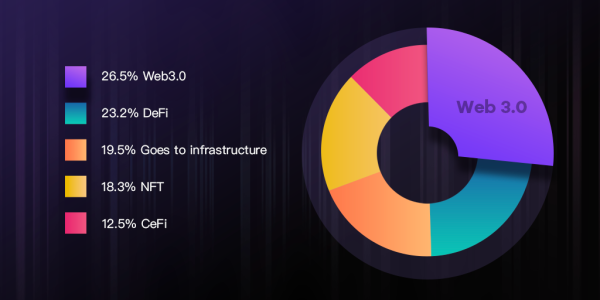
From this data it can be concluded that Web3 is very promising in the eyes of these venture capital institutions. In this list of the institutions, you can see that A16z, Three Arrows Capital, Sequoia Capital, Goldman Sachs, Tiger Fund and other well-known large VCss, and even tech giants such as Microsoft have begun to enter the market.
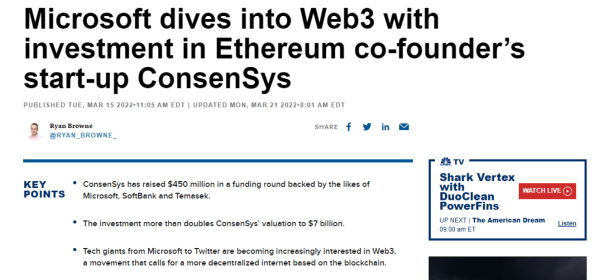
The internal investment ecology of Web3 has been gradually constructed and improved with the support of VCs, which highlights the recognition of community-based capital for Web3 ecology.
Syndicate, a DApp that provides financing services for Web3, has attracted the attention of famous investment institutions including A16z and Protocol Laboratory. On May 18, Syndicate announced on twitter that more than 2,400 investment clubs have been established on the DApp in the past four months. Even though the current market is weak, more people are still paying attention to the investment projects of Web3.
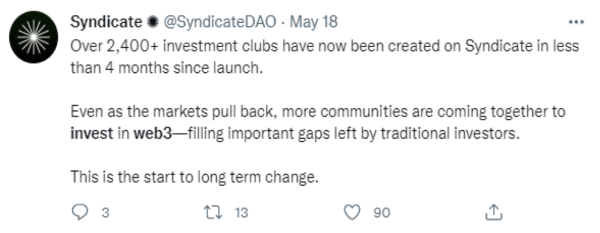
What problems can Web3 solve?
In Gavin Wood’s view, the model of Web2 is very similar to the social model before the emergence of the Internet, and Web3 appears because Web2 can no longer meet people’s needs in the era of rapid development. From the read-only network of Web1 to the read-write network of Web2, and then to the decentralized Internet of Web3, the evolution of the Internet reflects the direction of the evolution of social structure.
Although we can not yet figure out whether social organizations will develop in the direction of Web3, Web3 itself integrates all the Internet concepts under our current ideal model. At present, Web3 is more like solving the problems of unbalanced development, opacity and insecurity in Web2.
A report from Goldman Sachs reveals the rich concepts derived from Web3: decentralized network, privacy, creator economy… All these are to clarify the property rights, boundaries and protection in the Internet. From Web 1.0 and 2.0, to today’s 3.0 concept, the creation of content becomes more and more abundant, and the data becomes more and more complex. People have higher requirements for the protection and privacy of the content they create on the Internet. The combination of blockchain technology and the Internet not only protects personal data, but also adds a layer of financial attributes to help the creator’s economy grow in the environment of Web3.
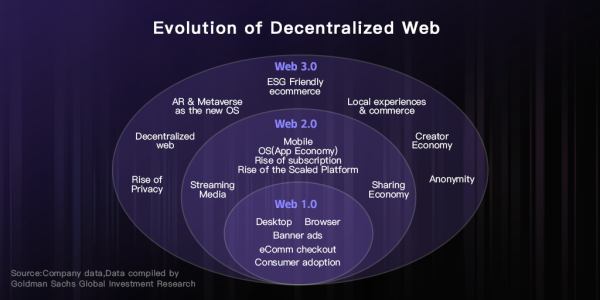
Why will Dmail break through in Web3?
The massive capital influx and the integration of blockchain technology with the Internet are promoting the development of the Web3 industry, thus people are seeing more projects call themselves “Web3”. For example, MetaMask, a payment tool in the Web3 era, and Mirror, a content tool in the Web3 era,and etc.,so far, the application of Web3 is still limited to a small number of people while there’s a long way for Web3 to be well known and applied by the majority. So what kind of DApps will break through in the growth path of Web3? This should be started with many problems of current Web3.
Overall, the problems in the application of Web3 can be summarized into three aspects: entry barrier, security and cost of use.
1. High entry barrier
Web3 DApp in our usual sense is the combination of blockchain technology and Internet applications. From creating a wallet, linking a wallet, using a wallet to DApp application operations, it is very different from the current Web2 application,which requires a long time to cultivate and educate users. In addition, the development of many applications only focus on the realization of product functions without considering user experience, which results in the problem of bad user experience and users’ inability to get started quickly.
2. Security and privacy issues
Although Web3 focuses on privacy protection and security performance, the overall security problems of the blockchain industry are no less than those of traditional Internet. In terms of technology, blockchain is still a key area that hackers attack in. According to statistics from the Internet, the amount lost in the encryption field due to hacker attacks has been close to $1 billion from March to April this year alone. In addition, it is not uncommon for the project itself to be attacked after being locked due to the vulnerability of the project’s own contract code.
3. Cost of Use
In addition to the high entry barrier, the biggest problem faced by Web3 popularization is the cost of gas fee. Due to the blockchain mechanism, any recording and broadcasting of the whole network needs the help of miners, hence gas fee has become a cost that Web3 users cannot bypass. This is a very troublesome problem for many new users. And the high cost of gas such as Ethereum has become a new obstacle for users to enter the market.
Despite the problems mentioned above, there is not an insurmountable gap between Web2 and Web3. Through the analysis of the problem, people can see a clue to get through Web2 to Web3: People can quickly understand and get started with no high cost, and the privacy problem can be solved perfectly. After analyzing the current Web3 development direction, I believe the track that is most likely to break through in the Web3 era is mailbox
Mailbox, the most fundamental component of the Internet, whether it’s office contact or daily login,one can’t live or work without. Email creates the frequent daily application scenarios of mailbox and the characteristics that users can quickly understand and use. As for the issue of cost and privacy, they need to be analyzed on an issue-by-issue basis.
In terms of the current development of the decentralized mailbox market, there are two alternative products: Dmail and Skiff.
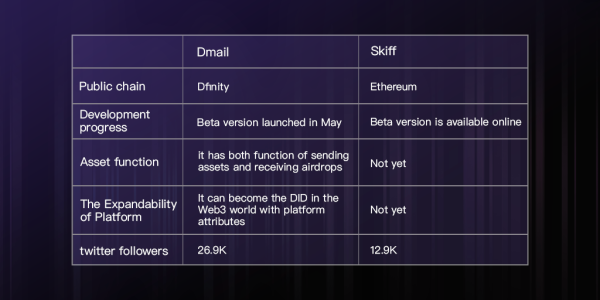
Among these two products, Dmail can be said to be the first Web3 mailbox application in the industry, which is deployed on the Dfinity chain. According to the information of its official social media, the test network will be online by the end of May or early June, and the number of social media followers has exceeded 20K. The update of the Skiff project is deployed on Ethereum, and there it still needs to catch up on the community development.
In terms of product function, Dmail focuses on Web3 mailbox while Skiff focuses on serving as a working platform. There are also differences in mailbox details. In its demo version, Dmail makes it clear that the mailbox has the asset function to make sure it can send crypto assets when sending mail,and the mailbox has the function of receiving airdrop mail. According to user’s observation on the beta versions of the other two mailbox applications, Skiff does not involve the asset function for the time being.
At the level of platform expandability, Dmail,due to its built-in asset management function,has the attribute of becoming an aggregating platform in the future compared with the other two mailbox applications. Moreover, since mailbox has the attribute of Internet identity in the Web2 era, after entering the Web3 era, mailbox applications with platform attributes can often produce the ancillary functions of DID. This is actually one of the most important factors that make Dmail better than the other two email applications.
In terms of cost, the hidden content is different behind the 0 Gas Fee that people know about both products. Dmail is built on the Dfinity chain, which is characterized by the reverse gas fee model, meaning that the gas fee generated by the user on the chain needs to be covered by the project side. Thistruly realizes 0 gas fee for users. The other two products are on the Ethereum chain and only come to the basic functions at present. With the enrichment of mailbox functions in the future, it is worth considering whether users can continue to achieve 0 gas fee.
From the perspective products, although Skiff has completed the launch of the beta version, it has basically completed the combination of wallet and mailbox functions. it can rely on wallet login to complete the function of email on chain while there is still a distance to the application of Web3. As for Dmail, although the development progress is behind slightly , its beta version should be launched in the near future according to the information disclosed by its official platform.
From the monthly updates report in recent months, Dmail supports the communication for Web3 and traditional mailboxes, and has completed the functions of mailbox and asset management after the beta version launch. From this point of view, Dmail may become the first real Web3 mailbox application on the market, and open the traffic entrance of the whole industry from Web2 to Web3.
According to the official public announcement of Dmail, the Beta version will contain the following updates:
- Dmail will be able to interact with any mailbox, making cross-communication with Web3 as well as Web2 entities possible. You will be able to send and receive emails from anyone on any email service, regardless of the service provider.
- Support for Plug and Internet Identity log-in.
- Settings will display the NFT domain account(s) owned in your Dmail account, and you will be able to choose one of them to bind with PID as your own mailbox domain account.
- Support temporary saving of unsent drafts.
- Allow viewing of sent emails in the outbox and the ability to edit even after sending.
- Autosave function for recently used contacts and addresses.
- Improved security features, like double verification of account and identity when interacting with Dmail for the first time.
- Basic 200MB storage space (which will include users to send up to 20 emails daily, with support for text, picture, audio, and video attachments).
- The current Beta version doesn’t support attachment downloads of 3MB and above.
- Allow outgoing mail attachments up to 3MB.
- Dmail will also be upgrading the overall user interface and capabilities so that you can carry out functions like batch operations, mark important conversations, flag spam, etc.
Of course, data and analysis can only be used as a reference. Each product will have different development cycles and problems in different stages. But both Dmail and Skiff represent a possibility of Web2 to Web3 migration. Users in the Web2 era can fully enter the Web3 world with the help of blockchain technology, with the most fundamental Internet tools such as email. The application that can drive users to complete the era migration will certainly become the greatest application in the next Internet era.
Conclusion
Recently, a paragraph published in an article “Web3: 2Be or not 2B” by Forbes well explains the attitude of Web3 pioneers.
“We expect to solve all the problems of the world with what is essentially an experiment, in which a small group of people take a risk, while the world watches on the sidelines. … We have one foot in the Pioneers’ club, and one in the Early Adopters’ club…”
Great progress is always slow and sudden. Slow means that the changes of things always accumulate strength in subtle places; Sudden means that quantitative change to qualitative change can be achieved overnight. Just as it is difficult to predict such a great development of the encryption industry two years ago, the process of Web3 is moving forward step by step.
It is a great honor that the users who have participated in Web3 are becoming the pioneers of an era.
Media Contact
Company Name: Crypto Explorer
Contact Person: Tony
Email: Send Email
City: Los Angeles
Country: United States
Website: www.lianancaijing.com

